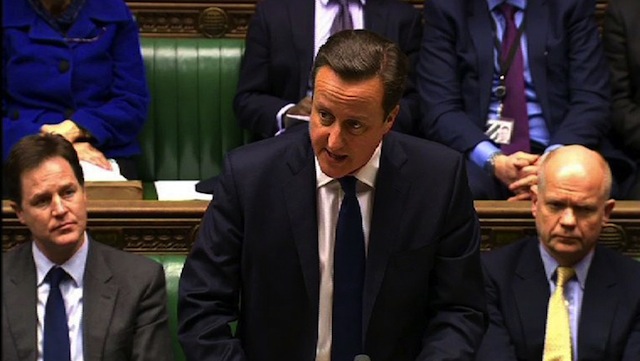SUMMARY
This is AI generated summarization, which may have errors. For context, always refer to the full article.

LONDON, United Kingdom (UPDATED) – British Prime Minister David Cameron on Wednesday, January 23, promised to hold a referendum by the end of 2017 giving British people the choice of staying in or leaving the EU if his party wins the next election.
In a long-awaited speech in London, Cameron said he wants to first renegotiate the terms of Britain’s membership of the European Union because “public disillusionment with the EU is at an all-time high”.
He said: “When we have negotiated that new settlement, we will give the British people a referendum with a very simple in-or-out choice.”
Cameron said that if his party wins an outright victory in the general election, it would hold a referendum during the first half of the new five-year parliament, by the end of 2017.
He warned that if the EU failed to bring in the reforms that he wanted, Britain could “drift” out of the 27-member bloc.
Cameron said the EU was grappling with the eurozone, “a crisis of European competitiveness” and the gap between the EU and its citizens had “grown dramatically in recent years”.
“If we don’t address these challenges, the danger is that Europe will fail and the British people will drift towards the exit,” he said.
Cameron has faced intense pressure from the eurosceptic right wing of the Conservative Party to take a stand on Europe, an issue that has long divided the party.
But his pledge to hold a referendum drew an immediate warning from one of Britain’s main European partners, France.
“It risks being dangerous for Britain itself because Britain outside of Europe, that will be difficult,” French Foreign Minister Laurent Fabius told France Info radio.
In a speech that he had originally planned to give in Amsterdam last Friday before the Algerian hostage crisis intervened, Cameron said his party would make the referendum pledge in its campaign for the 2015 general election.
“The next Conservative manifesto in 2015 will ask for a mandate from the British people for a Conservative government to negotiate a new settlement with our European partners in the next parliament,” he said.
“And when we have negotiated that new settlement, we will give the British people a referendum with a very simple in-or-out choice to stay in the EU on these new terms, or come out altogether. It will be an in-out referendum.”
Cameron said a rethink of Britain’s membership was essential because British people resented the intrusion into national life of unnecessary rules and regulations set by the EU.
The prime minister said he understood the “impatience” of those who want to hold a referendum immediately, but insisted the time was not right now.
“I don’t believe that to make a decision at this moment is the right way forward, either for Britain or for Europe as a whole,” he said.
“A vote today between the status quo and leaving would be an entirely false choice.”
Explaining why he wants to wait, Cameron said the eurozone crisis will leave the EU transformed “perhaps beyond recognition” and that Britain wanted to help shape the future of the bloc that emerges from it.
His insistence on holding a referendum with a stark in-or-out choice will anger his coalition government partners, the pro-Europe Liberal Democrats.
The leader of the main opposition Labour party, Ed Miliband, said the speech would show Cameron was “a weak prime minister, being driven by his party, not by the national economic interest”.
It will also dismay many business leaders, who have warned the referendum pledge risks creating uncertainty which will harm Britain’s economic prospects.
Cameron has also faced warnings from Britain’s close ally the United States against isolating the country from the EU. – Rappler.com
Add a comment
How does this make you feel?
There are no comments yet. Add your comment to start the conversation.